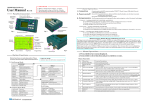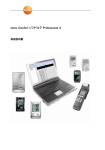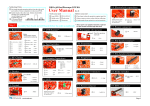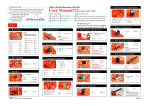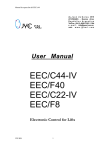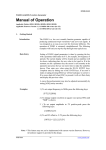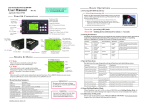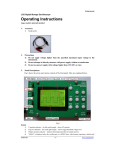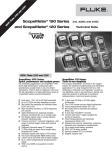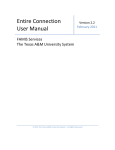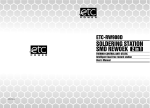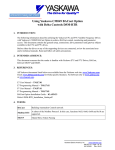Download Capacitance Meter Manual
Transcript
DN060-02v04 Capacitance Meter Manual Features l l l l l l About 1% accuracy. No calibration needed. Measuring range: 1pF - 500µF Automatic range select Zeroing available Real time serial output of measurement read-outs with time stamp Low cost and easy to build How to assemble 1. 2. Install components listed in the BOM onto PCB by following schematic and labels. Please ignore components that are not listed in the BOM even they appear in schematic and PCB. These parts are designed in for possible change in future or serve as options. Without them the meter works fine. Please note the polarity of C5 and C6. Their positive poles should go into the square pads. How to Use Measurement: Insert the capacitor to be tested into J5. Capacitance will be displayed. Alternatively caps not fitting into J5 can be connected through J3 with a pair of clips. Usually large caps take longer to show results but should not longer than 2 seconds. Zeroing: Remove cap (if any) from J5 and J3. Press the “ZERO” button. “C0 ” will display. Wait for it to disappear. Now the stray capacitance is compensated. The compensation value is stored in EEPROM and will remain in effect until another zeroing is performed. To obtain good measurement results for small capacitance shielding is required. To do this put the board into a metal box and connect the ground of the meter to enclosure. Serial Data Format: The ASCII output from TXD pin of J4 contains three fields: sequence number, measurement time (in seconds), and measured capacitance. The line format is as below. SSSSS TTTTT.tt CCCCU where ‘SSSSS’is 5 digit sequence number, ‘TTTTT.tt’is 8 digit time stamp (in second), and CCCCU is 5 digit measured capacitance with U being unit digit. Different fields are separated by 1 space. Each line is ended with ‘LF’(0x0A) and ‘CR’(0x0D). Output baud rate is 38400bps fixed. Data format is 8 data bits, 1 stop bit, and no parity. Output level is 5V. So a level converter is needed to connect to RS232 compatible device (PC serial port, for example). Specifications Error: Range: Power Supply voltage: Power Supply current: < 2% 1pF –500µF 8 –16 DC <30mA Troubleshooting 1. No Display (or garbage display without activity) Ø Ø JYE Tech First power supply should be checked. Make sure +5V is available at MCU power pins (pin 7 & 20 of U1). If power supply is good check if MCU gets clocked. This can be done by measuring the DC voltage at pin 10 of U1 (MCU). This pin is oscillator’s output. It should read about 2.5V if oscillator is working. If not Y1, C1, C2 and MCU should be checked. Usually this problem is caused by defective Y1, C1, or C2. MCU not programmed or programmed wrong can cause this problem too. -1- www.jyetech.com Capacitance Meter Manual DN060-02v04 Note: When we say voltages we mean voltage with refer to GND if not stated otherwise. 2. 3. 4. The display is stuck at “C0”when zeroing button is pressed Ø Check R11, R13, R15, R16, and related connections. Ø Test poles short (pin 1, 2, and 3 short to GND) can cause this problem too. Broken Display Ø Check all connections related to the LED display. Look for opens as well as shorts. Bad serial data output Ø Make sure level converter is in place if connected to standard RS232 devices. Ø Make sure correct data format is selected. Revision History Version Date Descriptions 01 2008.09.17 First created 02 2008.11.28 Modified for 109-06000-00B PCB. Removed reworking instructions since errors in previous PCB had been corrected. 03 2009.12.01 Added more detailed explanation for serial date format. 04 2010.02.25 Re-wrote the section “How To Assembly”. Revised the section “How to Use”. Added the section “Troubleshooting” JYE Tech -2- www.jyetech.com


